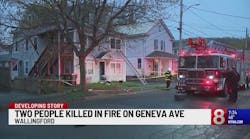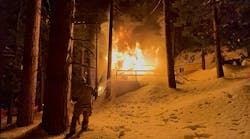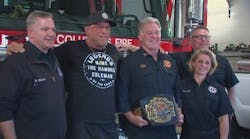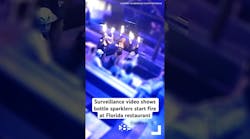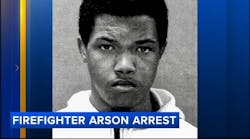Almost half of the 3,900 Onslow County fires reported in 2015 ended up not being fires at all.
That’s according to Onslow County Fire Marshal Brian Kelly, who said when a call comes in with little information, the full force of fire departments are dispatched just in case.
For example, Kelly said on Monday a call came in from someone who smelled gas near the U.S. 258 and N.C. 53 intersection in Jacksonville. There are multiple buildings around the location and without a specific destination or more information, emergency services responded as a worst-case scenario.
Nothing was found.
Other times, Kelly said someone may drive by a home and see smoke, so they call 911 to report it.
Dispatchers gather as much information as possible but Kelly said many times drivers don’t stop to investigate. Without knowing if the house is on fire or if there are people injured, firefighters respond prepared for anything.
“What a unit is dispatched to is not always what they find,” Kelly said, adding that the number of fires reported is higher than the actual number of fires.
Kelly said those units dispatched to a report of smoke at a home or building may find someone executing a controlled burn of leaves in the backyard, an HVAC unit smoking or even someone grilling dinner.
Most of the fire departments in Onslow County are volunteer centers, staffed by men and women who offer their time to keep Onslow County safe. Kelly said the main consequence of a high volume of false alarm fire calls is losing volunteers.
There’s a high turnover in volunteer firefighters, Kelly said, with most working an average of three to five years. A volunteer goes through the training and preparation for fighting fires and then are called away over and over from their child’s soccer game or date night with their spouse, only to respond to one false alarm after another.
“Where’s the return on that investment?” Kelly asked.
Each false alarm call takes about 30 minutes to complete, Kelly said. Once back at the station, a report needs to be written and the truck has to be readied for the next call. Even with false alarms, there are a lot of time-consuming behind-the-scenes actions that must be taken, and it can start to take a toll on volunteers.
“When that starts to happen . . . they start looking at it and going, at what point do we start taking the high priority as a family? Volunteers are becoming harder and harder to come by . . . the last thing we want to do is burn them out.”
In the city of Jacksonville, the call situation is much different. About 60 percent of calls are medical calls for vehicle crashes, someone having trouble breathing or chest pain, for example, according to Chief Jerry Hardison.
- The Jacksonville Fire Department responded to 3,561 calls in 2015 — 486 calls were false alarms due to detectors going off for non-emergencies, Hardison said.
If a detector is malfunctioning, it could result in a monetary penalty as well, Hardison said. If a detector malfunctions three times in 30 days, the resident or business owner pays a $50 fine.
When the fire department responds to a false alarm for a detector it requires one fire engine and four personnel minimum to respond, Hardison said, and about a half hour to complete the run.
Hardison said the Jacksonville Fire Department responds to false alarm fires — where a resident calls in seeing smoke at a house and there is no fire — only two or three calls per year.
“That is a rarity,” he said.
The low number is attributable in part due to the no-burning ordinance inside the city, Hardison said. A fire is only allowed inside city limits if it’s being used for warmth, a ceremony or cooking, and those few calls each year for smoke are usually due to a backyard grill.
While the county received many more false alarms than the city, Kelly said the community can help drop those numbers for 2016.
Kelly said providing more information — and more accurate information — when speaking with the 911 dispatcher director is key to providing resources where they’re needed most. It’s difficult to know what to expect when someone tells dispatch they just drove by the area and weren’t able to stop to find out more information.
Even though most calls are false alarms, Kelly said even those aren’t wasted time for the volunteers.
“We don’t want people to not call; when in doubt call,” Kelly said. “If a citizen is concerned . . . we want to make sure to give her the peace of mind that it’s OK.”
———
©2016 The Daily News (Jacksonville, N.C.)
Visit The Daily News (Jacksonville, N.C.) at www.jdnews.com
Distributed by Tribune Content Agency, LLC.
